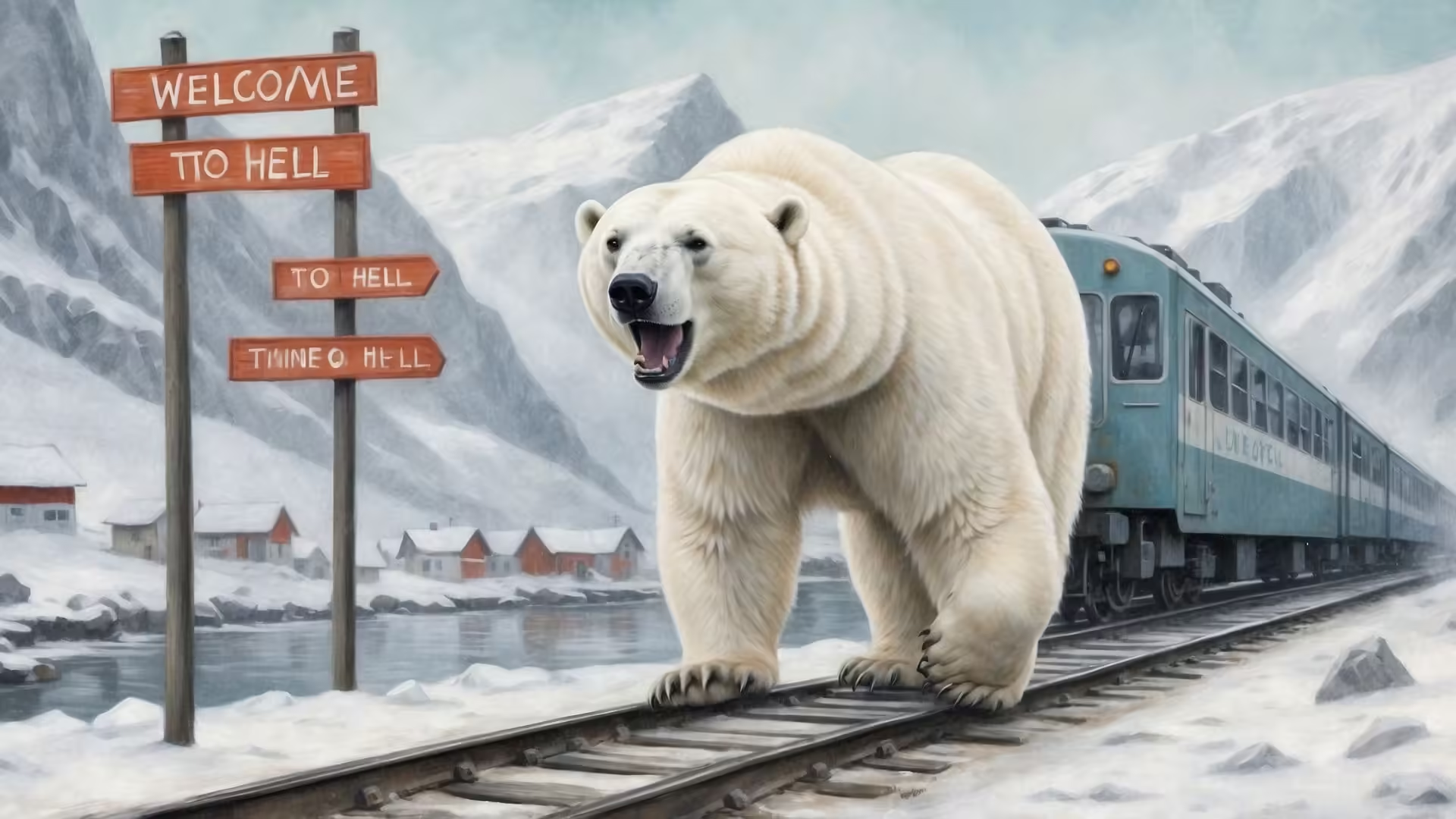The Gist
Where Is Hell, Norway?
Hell is a small town located in central Norway, just 30 minutes by train from the city of Trondheim. Nestled in the region of Trøndelag, it’s not your typical tourist destination—unless you find humor in its name, which has turned this modest town into a bit of a local celebrity. With a population of only a few hundred people, Hell offers visitors a chance to experience small-town Norwegian life with a side of curious charm.
How Did Hell Get Its Name?
The town’s name, Hell, comes from an Old Norse word, “hellir,” meaning cave or overhang. However, in modern Norwegian, “hell” translates to “luck” or “prosperity.” So, despite how it might sound in English, the name wasn’t intended to evoke fiery images of the underworld. Instead, it’s just one of those linguistic coincidences that turned an ordinary town into a unique attraction.
What Can You Do in Hell?
While Hell is a small place, it offers some fun opportunities for exploration. One of the most popular attractions is the Hell train station, where visitors love taking photos next to the station sign that simply reads, “Hell.” Tourists from all over the world can’t resist the chance to snap a picture and say, “I’ve been to Hell and back.”
Another fun fact: Hell experiences freezing temperatures in winter, making the phrase “when Hell freezes over” more literal than figurative. This quirky detail adds to the town’s appeal, especially for those who enjoy cold-weather humor.
While in the area, visitors can also enjoy nearby nature trails, local cafes, and the scenic beauty of the Trøndelag region. If you’re lucky enough to visit in the summer, you might catch the “Blues in Hell” festival, a lively music event that brings the town to life and draws crowds from near and far.
Why Has Hell Become a Tourist Attraction?
The town’s popularity is largely thanks to its name. Travelers can’t resist the novelty of visiting a place called Hell, and it has become a popular stop for those seeking out quirky destinations. The Hell train station, in particular, has become a must-see for people passing through Trondheim, adding a bit of humor to their travels.
Despite the jokes, the residents of Hell take the attention in good stride. They’ve embraced the humor, even using it as a way to promote local events and tourism. Festivals like “Blues in Hell” are proof that the town doesn’t take itself too seriously and knows how to have fun with its unusual reputation.
How Does Life in Hell Compare to Other Parts of Norway?
Living in Hell is much like life in any other small Norwegian town—quiet, scenic, and community-focused. Residents enjoy access to nature, a slower pace of life, and the unique distinction of living in a place with a famous name. While it doesn’t have the hustle and bustle of a big city, Hell’s proximity to Trondheim means that residents and visitors can easily access cultural events and amenities in the city.
The town also showcases the typical Norwegian charm, with its emphasis on sustainability, local community, and a love for the outdoors. Whether it’s cross-country skiing in winter or hiking in summer, Hell offers plenty of opportunities to enjoy nature and unwind from the stresses of daily life.
Final Thoughts
Hell, Norway, might be small, but it’s packed with charm, humor, and a sense of uniqueness that makes it a must-see for adventurous travelers. Whether you stop by the train station for a photo, explore the surrounding nature, or attend the “Blues in Hell” festival, visiting this quirky town is a fun way to add a memorable story to your travels. So, next time you’re planning a trip to Norway, why not make a detour to Hell and experience it for yourself? After all, how many people can say they’ve been to Hell and enjoyed it?
Let’s Talk
So, let’s be real—how many of you are now tempted to add Hell, Norway, to your travel bucket list? There’s something about quirky places like this that really grabs our attention, isn’t there? I mean, how often do you get the chance to say, “I’ve been to Hell and back” with a straight face? It’s such a great conversation starter. I can already imagine showing off that train station photo and watching people’s reactions: “Wait, there’s really a town called Hell?!”
But there’s more to this town than just its name. It’s kind of amazing how a small place like Hell can attract so much attention simply because of a word. It makes you wonder how much of our curiosity about the world is driven by little oddities like this—things that make us laugh, scratch our heads, or just stop and think. Do you ever feel drawn to these kinds of places? Whether it’s visiting the largest ball of twine or standing on the Equator line, there’s a charm in going off the beaten path, right?
What I love about Hell, Norway, is how the residents have embraced the humor. Instead of rolling their eyes every time a tourist shows up for that iconic train station photo, they’ve leaned into it. Hosting events like the “Blues in Hell” festival is such a clever way to turn the joke into something positive. That kind of attitude says a lot about how we approach life’s quirks, doesn’t it? When something unexpected comes along—like, say, living in a place called Hell—you can either resist it or embrace it and make it part of your story.
And let’s not forget how symbolic this town can feel. Ever hear someone say, “I’ll do that when Hell freezes over”? Well, it literally does freeze over every winter in Norway, which feels like life’s way of reminding us that anything is possible—even the things we think are impossible. Makes you wonder: How many things have we written off as unlikely, only to have them sneak up on us later? Has anything ever happened in your life that you thought never would?
I think visiting a place like Hell is also a reminder that travel isn’t just about glamorous destinations. It’s about stories, humor, and sometimes just collecting those weird little moments that make life interesting. Ever been on a road trip where the highlight wasn’t the destination but some odd roadside attraction you stumbled across? Maybe that’s what Hell teaches us—it’s okay to embrace the unexpected and enjoy the journey, even if it takes you somewhere you didn’t plan to go.
So, if you had the chance, would you visit Hell? And more importantly, what other quirky places would you love to see? Maybe it’s time we all started looking for the “Hells” of the world—those little hidden gems that make us smile, challenge us to see things differently, and remind us that life doesn’t always have to be serious. Because honestly, the best stories are often the ones with the biggest surprises.
Let’s Learn Vocabulary in Context
Talking about Hell, Norway gave us some great words and phrases that we can easily use beyond just discussing quirky travel destinations. Let’s break down how these words fit into the conversation and how you can apply them in real life.
First up is quirky. It describes something unusual in a charming or interesting way. Think of those odd little restaurants or strange roadside attractions you come across on a trip. You could say, “That old bookstore downtown is so quirky—it has a section just for cat-themed mysteries!”
Next, we have attraction. It refers to a place or event that draws people’s interest. While we often use it for tourist destinations, it works for anything that pulls people in, like a concert or even a new restaurant. “The new cafe has become a huge attraction in our neighborhood.”
Embrace is another important word. It means to accept or welcome something openly, even if it’s unexpected. You might say, “I decided to embrace the rain and go for a walk anyway.”
Then there’s destination, which refers to the place where someone is going. Whether it’s a far-off country or just the grocery store, it works in all contexts. “Our next vacation destination is Italy—I can’t wait!”
We also talked about symbolic, which means something that represents a bigger idea. It’s not just about literal meaning; it’s about deeper significance. “Giving someone a plant as a gift can be symbolic of growth and new beginnings.”
Quaint is another fun one. It describes something charmingly old-fashioned. It’s perfect for talking about towns like Hell or cozy places that feel like they belong in another time. “We stayed in a quaint little cabin in the mountains.”
Journey comes up a lot in travel conversations, but it’s also a great metaphor for life. It’s about more than just reaching your destination—it’s about the experiences along the way. “Learning a new language is a journey, not just a goal.”
Unexpected is another handy word. It describes something surprising or unplanned. You could say, “I ran into an old friend at the airport—such an unexpected surprise!”
Proximity refers to how close something is to another thing. It’s useful when talking about travel or even relationships. “The best part of the apartment is its proximity to the subway.”
Finally, freeze over is a phrase that’s literal but often used figuratively. In real life, it means when water turns to ice, but it’s also used for impossible situations. “I’ll apologize when pigs fly—or when Hell freezes over.”
Now, here are a couple of questions to think about: Have you ever had a journey that didn’t go as planned but turned out to be even better? And what’s a quirky place or unexpected experience you’ve had that made your trip unforgettable?










0 Comments